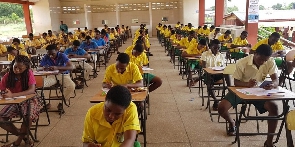 Government owes GH¢118 million to WAEC, organisers of the WASSCE
Government owes GH¢118 million to WAEC, organisers of the WASSCE
The delay in releasing the West African Senior School Certificate Examination (WASSCE) results has thrown nearly half a million students into uncertainty, exposing deep-seated problems in our educational sector. When broken scanners and unpaid bills can hold an entire generation’s future hostage, we must question the robustness of our educational institutions.
The stark reality is that 460,000 young Ghanaians are currently in limbo, their academic and professional aspirations suspended by administrative inefficiencies and financial mismanagement.
The government’s GH¢118 million debt to the West African Examinations Council (WAEC) speaks volumes about our priorities and fiscal responsibility. It demonstrates to the watching world, the systematic erosion of educational infrastructure that should serve as the backbone of national development.
What makes this situation particularly troubling is its preventability. Basic equipment maintenance and timely payment of obligations should be routine matters, not triggers for national crises. The substantial government arrears, show that this is a continuous and concerning pattern of neglect in our educational administration.
The ripple effects extend far beyond immediate inconvenience. Universities’ admission processes are disrupted, students may miss crucial application deadlines, and families face extended periods of uncertainty. For many students from modest backgrounds, such delays could mean the difference between continuing their education and being forced to defer their dreams.
Moreover, Ghana’s situation threatens to undermine the regional educational framework. As a key member of WAEC, our operational difficulties risk compromising the standardisation of qualifications across West Africa. This could have long-term implications for academic mobility and professional recognition within the subregion.
The path forward requires more than just emergency interventions. While immediate funding to clear the arrears is essential, we need systematic reforms to prevent similar crises. This includes developing robust maintenance protocols, establishing reliable funding mechanisms, and implementing technological redundancies to safeguard against equipment failures.
The WASSCE results delay must serve as a wake-up call. It highlights the urgent need to modernise our educational infrastructure and ensure sustainable funding for crucial educational services. Our students deserve better than to have their futures held to ransom by preventable institutional failures.
What is the point of the Free Senior High School policy if this is the end result? Let this show of shame serve as a catalyst for meaningful reform in how we manage and fund our educational institutions. The future of our youth – and by extension, our nation – depends on it.
Watch the latest edition of BizTech below:
Click here to follow the GhanaWeb Business WhatsApp channel